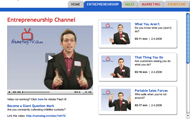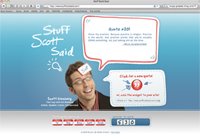 Emerson once suggested, “Make yourself necessary to the world, and mankind will give you bread.”
Emerson once suggested, “Make yourself necessary to the world, and mankind will give you bread.”
Bread meaning support and livelihood.
Bread meaning money and financial reward.
Bread meaning nourishment and sustenance.
Dee-licious.
Unfortunately, as profound as that quotation is, there’s never been much of a how-to on the topic.
Until now.
Here’s a list of nine strategies for making yourself necessary to the world:
1. Be essential. Whenever there’s a technology-related problem in my family, my Dad is the go-to guy. Not because he’s a computer engineer. Not because he can fix everything. But because he’s a master problem solver. See, as a veteran CEO, the thought process he undertakes to approach challenges – organizational, electrical or interpersonal – revolve around logical, linear thinking.
Not everyone in our family can do that. And that’s what makes my dad necessary to the world: We’d be screwed without him. To whom is your unique thought-process essential?
2. Be inescapable, inevitable and unavoidable. In Jeffrey Gitomer’s Little Platinum Book of Cha-Ching, he revealed the genius behind sales legend John Patterson: “Rather than just trying to sell the concept of a cash register, Patterson create the demand for a receipt.”
Cool. Because that way, Patterson didn’t have to sell. Every consumer who made a purchase and demanded a receipt made the sales pitch FOR him. All Patterson had to do was supply the cash registers. (And then ring one of his own!) He was necessary to the world. How could you make it impossible for people to NOT do business with you?
3. Be the cure, the answer and the shortcut. Halfway through Pulp Fiction, mob hit men John Travolta and Samuel L. Jackson run into a BIG problem: They accidentally shoot their key witness, Marvin, in the face. Naturally, the backseat of their car is a bit messy.
In a panic, they call their boss, Marsellis Wallis, for help. And his response is, “You ain’t got no problems. I’m on it. Go back in there, chill those guys out and wait for The Wolf, who should be coming directly. Feel better?”
Upon hearing who was on the case, Samuel L. Jackson replies, “You’re sending The Wolf? Shoot. That’s all you had to say!” Twenty minutes later, Harvey Keitel shows up to their house dressed in a tuxedo, rings the doorbell and says, “HELLO, my name is Mr. Wolf. I solve problems.”
Now that’s what I call being necessary to the world. Maintaining such a positive reputation that when people hear the mere mention of your name, a wave of calm comes over their soul. What are you the shortcut for?
4. Become a possiblitarian. Norman Vincent Peale coined this term in his book, The Tough-Minded Optimist, which I recently bought for three bucks at a book fair in Brisbane.
“With a possiblitarian, you get the idea that he actually enjoys problems. That life would be dull without them,” he wrote. “And when the gloom artists sit around, taking dismal views, they wonder why they never saw the possibilities in the first place.”
Your challenge, according to Peale, is to walk around the problems mentally and prayerfully and see what you see. He contends that you will never see a problem that doesn’t have a soft spot if you just keep on poking.
I totally agree. It’s about facing problems artfully and loving them enough to convert them into something beautiful. It’s about asking people this question: If, overnight, a miracle occurred, and you woke up tomorrow morning and the problem was solved – what would be the first thing you would notice?
5. Become noticeable in your absence. Not only do you want people to notice when you’re away, you want people to miss you, too. To wonder: (1) Where you’ve gone, (2) Why you’ve left, and (3) When you’re coming back. And not in that stalker, micro-manager, Big Brother kind of way. But from a baby-I-love-you-so-please-don’t-go kind of way.
It’s like driving cross-country with so many boxes in the back seat that your rear view mirror becomes useless. And what happens is, you still look in the mirror out of habit, but because it’s blocked, you suddenly realize how often you actually use it.
Ever happen to you? That’s being noticeable in your absence. Compelling customers to look in the rearview mirrors of their daily lives and think, “Damn it! I wish Steve was here.” Who misses you when you’re gone?
6. Develop signature and singular capabilities. After finishing a marketing workshop in Great Falls, Montana, my client took me by Fritz’s Auto Repair Shop. Now, for some reason, I kept hearing about this place from all the locals.
When we arrived, I asked my client, “What makes Fritz’s so popular?” He smiled and said, “Well, just look around. What do you notice about the cars in lot?” And then it hit me: They were all Cadillacs. Every last one of them. From ’56 Coupe de Villes to ’71 El Doradoes. Apparently, Fritz actually worked on the Cadillac assembly lines for twenty years. Then he spent the next five years as a contract consultant for Cadillac.
Eventually, he retied and opened his own shop in Montana. And the promise he’s made to his customers for the past twenty years is: “Fritz will fix any problem, any model, any year – as long as it’s a Cadillac.” He has a three-month waiting list and does ZERO marketing. Customers drive in from hundreds of miles away just to have Fritz work on their Caddillacs. Why? Because he’s The Only. And that’s what makes him necessary to the world. What are you the world heavyweight champion of?
7. Plug your expertise into strategy needs. Which means you have to be a resource. An expert. An advisor. Not a salesperson. Not an employee. Not a consultant. A Thought Leader who anchors her expertise in that which is timeless. That’s how you get invited to strategy tables. When you demonstrate that it’s not about what you do, it’s about the effect of what you do. Do you solve problems that are real, expensive, urgent and pervasive?
8. Position yourself as an unconditional servant of truth. Interface Construction is one of the largest minority-owned firms in my hometown of St. Louis. During their 30-year anniversary celebration in 2008, I had the honor of meeting their president and founder, Sam Hutchinson.
Now, the question I asked him was, “Sam, after thirty years of profitable growth – what’s Interface’s secret?” And his response floored me. Certainly not the kind of insight I expected to hear from a construction guy. He said, “Scott, our job is to respond to the demands of truth.” Whoa. I thought he was going to spout some construction cliche like, “Measure twice – cut once.” No wonder their company is so successful. Have you decided to become a servant of truth?
9. Position yourself as the only path to fulfillment. Position your expertise in such a way that your fans wouldn’t DARE go into the marketplace without your opinion. That way, they wouldn’t make a move without consulting you first. Now, this can happen if you aren’t selfish with your knowledge. Because if you share your expertise generously, people will recognize it, became addicted to it and eventually depend on you for it.
That’s called mindshare, and it eclipses the value of marketshare. Suggestions: Courageously step forth and make your natural talents available. To put LOTS of samples out there. Not just a few pieces of chicken on toothpicks – we’re talking free Happy Meals for EVERYBODY. Also, regularly let people know the different ways they can use you. This will crate a need for what you have to uniquely offer. That will make you necessary to the world. What makes you The Only?
REMEMBER: Your mission to make yourself, your business and your value desirable, needable and wantable to the point of absolute necessity.
LET ME ASK YA THIS…
How will you make yourself necessary to the world?
LET ME SUGGEST THIS…
For the list called, “29 Pieces of Simple, Easy Advice That Will Change Your Business Forever,” send an email to me, and I’ll send you the list for free!
* * * *
Scott Ginsberg
That Guy with the Nametag
Author, Speaker, Coach, Entrepreneur
[email protected]
 New website go live this week?
New website go live this week?
Tune in to The Entrepreneur Channel on NametagTV.com!
Watch video lessons on spreading the word!
 Doors are for amateurs.
Doors are for amateurs. Never the same speech twice.
Never the same speech twice.
 When my publishing/consulting company was just starting out, I worked nights & weekends at The Ritz Carlton to make ends meet.
When my publishing/consulting company was just starting out, I worked nights & weekends at The Ritz Carlton to make ends meet. 1. Advance the conversation. Stop the bloodsucking and start the billing. Otherwise move on. Your time is too expensive. Are people picking your brain or
1. Advance the conversation. Stop the bloodsucking and start the billing. Otherwise move on. Your time is too expensive. Are people picking your brain or 
 The Sanskrit word namaste translates to, “The sprit within me honors the spirit within you.”
The Sanskrit word namaste translates to, “The sprit within me honors the spirit within you.”
 You can’t make people ask you questions.
You can’t make people ask you questions. Are you a trusted source who moves people with innovative ideas?
Are you a trusted source who moves people with innovative ideas? People who complain that they can’t find any good ideas should their vision checked.
People who complain that they can’t find any good ideas should their vision checked.  Who’s quoting YOU?
Who’s quoting YOU? Emerson once suggested, “Make yourself necessary to the world, and mankind will give you bread.”
Emerson once suggested, “Make yourself necessary to the world, and mankind will give you bread.” The more people trust IN you, the more they will bet on, buy from, follow after, stand beside and tell others about you.
The more people trust IN you, the more they will bet on, buy from, follow after, stand beside and tell others about you. Everyone’s just waiting to get discovered.
Everyone’s just waiting to get discovered.